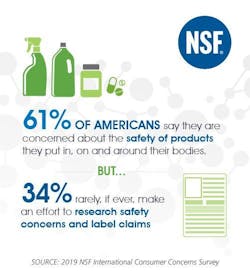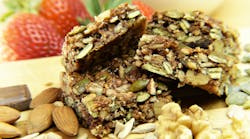ANN ARBOR, Mich., May 16, 2019 (GLOBE NEWSWIRE) -- NSF International, an independent public health and safety organization, released a new study showing 61% of Americans are concerned about the products they put in, on and around their bodies. However, 34% say they rarely or never research product claims. Almost half (46%) of Americans say they have purchased a product despite being unsure of the validity of product claims.The online survey conducted in February 2019 on behalf of NSF International polled a representative sample of 1,000 Americans about their concerns related to food, dietary supplements, personal care products and home cleaning products. The survey reveals a nearly a 50/50 split between people who say product claims are helpful and those who say they are confusing, overwhelming or meaningless.According to the survey, Americans trust claims tested and certified by independent organizations more than claims made by product manufacturers and brands. These findings suggest self-declared claims made by brands and manufacturers without any independent verification may contribute to consumer confusion and mistrust.“It’s clear that many consumers have questions and concerns about the safety and authenticity of the products they buy, but they don’t always know whom to trust or where to turn for an honest answer,” said Lisa Yakas, Senior Product Certification Manager at NSF International. “As consumers, we increasingly want brands and marketers to back up their claims with data and to prove products contain only the ingredients that are listed on the label.”Highlights from the 2019 survey include:
- Third-party certification is highly trusted. Across all four product categories, 85% trust independent, third-party certification organizations and 78% trust claims made by government agencies. Conversely, only 32% trust claims made by celebrities and influencers.
- Men are more likely to trust claims made on social media or by celebrities or influencers. Men are significantly more likely to trust claims on social media (44% vs. 31% of women), as well as claims made by celebrities or influencers (39% vs. 26% of women).
- Millennials have much greater concern over product safety and younger Americans are generally more trusting of claims made on social media. 74% of Millennials are concerned about potentially harmful food and other consumer products. By comparison, only 64% of Gen X and 53% of Baby Boomers are concerned about the safety of these products. Nearly half of Millennials (48%) and half of Gen Xers (51%) trust claims on social media.
- Parents have much greater concern over the safety of products they put in, on and around their bodies. 79% of parents are concerned compared to 55% of non-parents. Interestingly, 45% of parents (compared to just 17% of non-parents) admit they have purchased a product despite realizing its claim was invalid.
The findings suggest many consumers are unsure how to research and verify claims for themselves, and may be unaware of third-party certification programs operated by independent organizations and governmental agencies.The study also drilled down into consumer views of specific product categories and found:
- Majority of Americans prioritize food quality over safety. 81% of Americans assume the food products they consume adhere to strict safety standards, which may help explain why most consumers focus on food quality over safety. 36% rarely or never look at claims made on food items.
- Safety of cleaning products is the top priority for most people. 83% are more likely to trust a cleaning product with an independent certification, but 48% said they did not know cleaning products can receive safety certifications.
- Americans may automatically assume that all personal care products are safe. 81% assume the personal care products they use adhere to strict quality and safety standards. Additionally, 60% of Americans don’t check to see if personal care products adhere to strict quality and safety standards—and 52% don’t know that personal care products can be certified.
“Given the complexity of global supply chains and the fact that health and safety standards vary by country, it’s challenging for consumers to conduct their own research into everything they buy,” said NSF International’s Lisa Yakas. “Independent third-party certification is the easiest way for consumers to check the safety and authenticity of products and the validity of product label claims.”From verification of claims like gluten-free, non-GMO and raised without antibiotics to certification of products like dietary supplements, bottled water, drinking water filters and home cleaning products, NSF International tests and certifies more than 30,000 products a year. NSF experts also conduct more than 220,000 audits and inspections of manufacturing facilities worldwide each year.“When consumers see the NSF mark on a package, they can be sure the product has gone through extensive testing and review for potential health and safety risks as well as testing for the accuracy of label claims,” Yakas said.As a global public health organization, NSF International’s mission is to protect and improve human health – protecting the food you eat, the water you drink, the health care products you use and the environment we all share.
To read the full details of NSF International's Consumer Survey, please visit: http://www.nsf.org/media/enews/documents/nsf_consumer_concerns_survey_2019.pdf
For more information or media inquiries, please contact Thomas Frey, APR at [email protected] or 1 (734) 214.6242. In 2019, NSF International is celebrating 75 years of protecting and improving human health. The independent, global organization facilitates standards development, and tests, audits and certifies products for the food, water, health sciences, sustainability and consumer goods industries to minimize adverse health effects and protect the environment. With operations in more than 175 countries, NSF International is committed to protecting human health and safety worldwide. NSF International is a Pan American Health Organization/World Health Organization (WHO) Collaborating Center on Food Safety, Water Quality and Indoor Environment.
Survey methodology
An independent research firm conducted the survey on behalf of NSF International among a nationally representative sample of 1,000 Americans living in the continental United States. The survey was fielded between February 20 – March 1, 2019 and has a margin of error of +/- 3.0 percentage points at the 95% confidence level.








